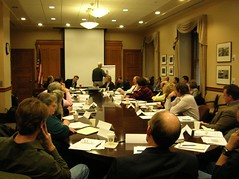Of late, the book The Price of Government has gotten a lot of attention. The thesis of the book is that citizens essentially pay a fixed percentage of their personal income to government (36% for the last 50 years in the U.S.) and government needs to figure out how to spend it most effectively. I don’t necessarily buy into the whole idea (many European states have higher ‘costs of government’ and arguably better quality of life), but I wholeheartedly agree that government needs to budget on the basis of meeting citizens’ needs, rather than continuance of a service model (current service level budgeting).
Of late, the book The Price of Government has gotten a lot of attention. The thesis of the book is that citizens essentially pay a fixed percentage of their personal income to government (36% for the last 50 years in the U.S.) and government needs to figure out how to spend it most effectively. I don’t necessarily buy into the whole idea (many European states have higher ‘costs of government’ and arguably better quality of life), but I wholeheartedly agree that government needs to budget on the basis of meeting citizens’ needs, rather than continuance of a service model (current service level budgeting).
We’re about to see two applications of this in local transportation budgeting. Metro now has an RFP out on the street for its Regional Transportation Plan update process, and has specifically called out the “budgeting for outcomes” process for the contract. A shorter article form (PDF, 2M) of the book’s message is actually called out in the RFP. From that article:
“Traditional budgeting, which focuses on costs rather than results, is the dead horse of the public sector. When we budget for costs, we get more of them. What we don’t get is the innovation and accountability for results we need if we are to win the competition for public support.”
But the main focus of this post is the PDOT budget process. Commissioner Adams has committed that he won’t seek a new revenue source for transportation until he has shaken every dime out of the current budget. To that end he has engaged a consultant team to apply the budgeting for outcomes process and established an advisory committee to help guide the process and give input on the desired outcomes. I was invited to be a member of the advisory group and attended the first meeting last Thursday.

The task is daunting. PDOT has a budget gap of $5.5M in fiscal year ’06-07, growing to $11M in FY10-11.
Meanwhile, PDOT is charged with operating and maintaining a set of civic assets valued at more than $10 Billion (yes, that’s Billion with a B). These include streets, sidewalks, signals and their controllers, lighting and a few buildings.
Our job will be to rate PDOT’s service and compare that to our perception of the City’s needs. Where PDOT is exceeding expectations, that’s an opportunity to look at dialing back expenditures and redeploying those funds either to invest in areas where PDOT is not meeting expectations, or to plug the budget gap.
We’ll need your help. There will be a citizen input session, complete with electronic polling (and refreshments), where you can weigh in on these questions:
Tuesday, December 13, 2005
5:30 to 7:00 p.m.
World Trade Center
Plaza Conference Room
121 SW Salmon St., Portland
After that, our advisory committee will reconvene in January to provide our advice to PDOT management.
So what do you think – where can PDOT afford to trim? Where do we need more investment?

One response to “Budgeting for Transportation Outcomes”
Some ideas on ways to use transportation resources better over at Commissioner Sam.